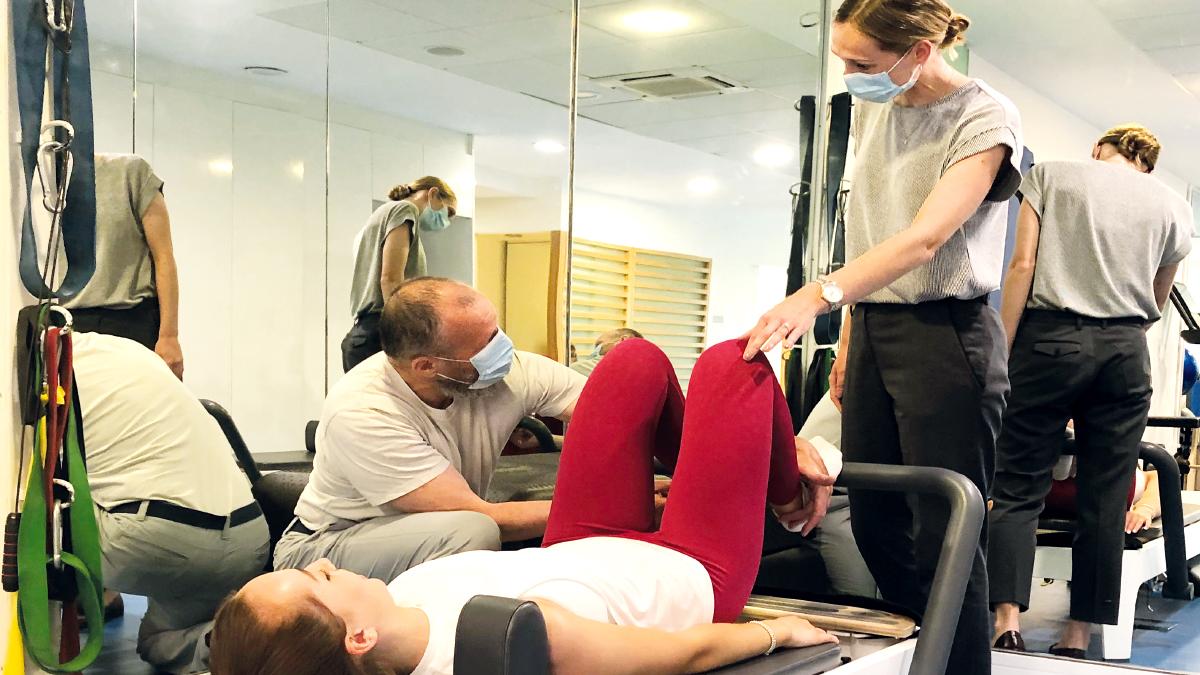CSP professional advisers Rachael Wadlow and Claire Fordham talk about a new collaboration working with exercise professionals in multi-professional rehabilitation contexts

In April 2021 the CSP Council and subsequently the CSP decided to support the development of a newly defined role for clinical exercise physiologists (CEPs), allowing them to be accredited and join a new voluntary register.
Not surprisingly, reactions to this from the profession were mixed. Most members who engaged with us on this issue recognised and championed the role of exercise professionals working alongside, and in addition to, the physiotherapy workforce. For others, this felt like a counter-intuitive move from council; why would the profession risk losing one of its pillars of practice– exercise – to other professions?
The reality, and reason for council’s position is that exercise prescription is not the reserve of the physiotherapy profession and the CSP welcomes the wider workforce in its pursuit to ensure rehabilitation is accessible to all.
By taking this position the CSP seeks to support those who strive to ensure that all professionals who use exercise as part of their role in rehabilitation or public health pathways have the right knowledge, skills, attributes and competence to do this safely and effectively.
The shared ground was the asking of the emotive question ‘how does the profession work best with exercise professionals and in ways where knowledge and skill sets are equally included, valued and optimised?’
Therefore, at the same time as announcing that council would support the development of CEPs, it asked CSP officers to develop a way of showcasing the profession’s role and value in the pillar of exercise, movement and rehabilitation and how it can work to best effect with exercise professionals.
In scoping this work we sought out areas of the profession that already work successfully with exercise professionals to see what could be learned.
We are currently working with expert members from the professional networks and other stakeholder organisations to develop a series of illustrative case studies, showcasing the role of the physiotherapy workforce in multi-professional rehabilitation contexts and best practice collaboration with exercise professionals
The field of sports medicine came to mind and we contacted Claire Small, vice chair of the Musculoskeletal Association of Chartered Physiotherapists and chief clinical officer of an independent sports medicine provider to share her learning and experience. Her message was clear – collaborate don’t compete – and sharing her tips on successful working practices, said:
We have a team of specialised physiotherapists, strength and conditioning coaches and clinical exercise physiologists all working together for a shared purpose; optimal patient outcomes and satisfaction.
They understand one another’s roles and how each profession can add value to the patient’s rehab. Communication, trust and working relationships are key; we encourage all our therapists to spend time together, understanding each other’s practice by observing patient appointments and doing joint sessions.
‘But we learnt quickly that you can’t collaborate if you’re in different parts of the building so we developed shared rehab space to facilitate the team approach.
‘Now more than ever, service users expect to be managed by a multi-professional team; they expect to be referred on if there is someone else whose skill-set better meets their needs and we should be confident as the physiotherapy workforce in identifying when one of our exercise professional colleagues can work alongside us to facilitate that individual’s progress.’
The principles of successful working practices in sports medicine can easily be transferred to other areas of our profession.
Communication, team working and shared goal setting are key parts of our professional practice that should underpin any multi-professional rehabilitation team, regardless of speciality, sector or level of practice.
If we truly are a profession who structures its input around what’s best for our patients, communities and populations then along with championing our role and value we must also be prepared to do our best work hand in hand with others.
The CSP’s Professional Advice Service gives advice and support to members on complex and specialist enquiries about physiotherapy practice, including professional practice issues, standards, values and behaviours, international working, service design and commissioning, and policy in practice. Find out more.
Number of subscribers: 3




































